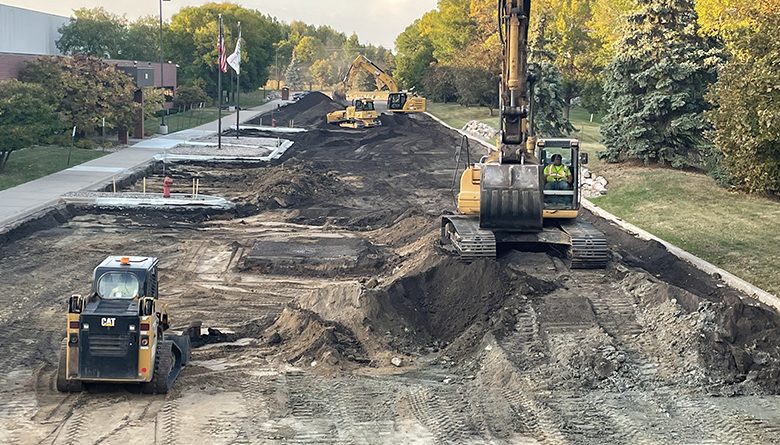Preparation of Commercial Asphalt for Heavy Winter Traffic
Winter can be particularly harsh on asphalt, especially for businesses that rely on smooth, safe parking lots and roadways. Freeze-thaw cycles, heavy traffic, and snow and ice can pile up on asphalt if it is not prepared for this treacherous season. Here are some essential tips on how to protect your commercial asphalt during winter, ensuring it looks great and functions well even in the harshest of conditions. You can also hire professional commercial asphalt services for better assistance.
1. Seal the Cracks Before It Gets Cold
Seal any cracks. Though it will go a long way in protecting your asphalt against winter, seal it ahead of time before temperatures drop. Water-penetrating cracks in asphalt expand as they freeze, causing the cracks to widen considerably during winter. Sealing a crack before winter prevents water from penetrating and lowers the chances of developing potholes and further damage.
Tip: Do it early in the season, when the weather is still relatively mild, so the sealant can really adhere well to the asphalt.
2. Apply a Protective Sealcoat
Sealcoating is the protective coat of armor for your asphalt, shielding it from moisture, UV rays, and nasty chemicals like salt. It prevents water penetration, making the surface less prone to cracking and breaking up from winter traffic.
Tip: Sealcoat in late summer or fall. Sealcoating needs to fully cure, and dry, mild weather is usually not available when you need it most: in the winter.
3. Maintain Appropriate Drainage
Appropriate drainage will prevent water from standing, freezing, expanding, and bursting the asphalt surface. Blocked drains could pool water and ice under the pavement. Ensure your gutters and drainage systems are clear.
Tip: Regularly check and de-clog drains to prevent blockages and ensure they work to efficiently remove water from the asphalt.
4. Use the Right De-icing Products
Not all de-icing products are created equal when it comes to winter maintenance. While rock salt is often the first thought for many, in reality, it will damage asphalt if consistently used over the long term. Calcium chloride and magnesium chloride both cause less damage to asphalt and work at lower temperatures.
Tip: Try not to use too much de-icer; instead, apply a consistent amount evenly across high-traffic areas.
5. Develop a Snow Removal Plan
Snow removal is important in making your asphalt passable and safe during the winter, but it needs to be managed well. Heavy snow plows can scrape, gouge, or even crack your asphalt if operated incorrectly.
Tip: Hire professional snow removal services that have experience working on asphalt. When using in-house equipment, raise the plow blade a quarter inch higher above the asphalt surface to avoid scraping.
6. Mark Areas for Easier Snow Clearing
Clear lines and signage in the parking lot will save you a lot of time on clear-up and prevent possible damage from snow removal equipment. Visibility is also enhanced; thus, visitors will know where to park and walk even in icy conditions.
Tip: Have your parking lot lines striped or repainted before winter for visibility and intact lines throughout the season.
7. Schedule Routine Inspections
If it’s not discovered early, the smallest issue can quickly become a big problem. Regular walk-throughs and inspections of your property, especially checking the asphalt surfaces right after every snowfall for any signs of cracks, depressions, or pooling water, can save costly springtime repairs.
Tip: Have a checklist for every walk-through inspection with a corresponding record of concerns you might need to follow throughout winter.
8. Control Traffic Flow to Prevent Overload
If your commercial property sees a great deal of heavy truck traffic, the winter can be very destructive. Freeze-thaw cycles compound the heavy loads and can cause serious cracking or deformation in the asphalt. Pay attention to the flow from heavy vehicles and make adjustments so that they circulate throughout the rest of the property to try to minimize heavy stress on a single point.
Tip: Restrict heavy truck access to routes with stronger structural support and control traffic to specific pathways or sections.
9. Book Your Post-Winter Repairs Early
Unfortunately, winter will cause minor damage to the asphalt surface. When winter passes, inspect the asphalt for areas of damage and schedule repairs as soon as possible before the spring traffic increases. Minor damage from winter will be lessened before it becomes a bigger issue, keeping your commercial property appearing professional.
Tip: Check for potholes, faded lines, and areas with standing water. Small repairs in spring can prevent much bigger ones later.
Conclusion
Prep your commercial asphalt for harsh winter traffic. These will prolong its lifespan and ensure a safe place for visitors and employees. Now, you can protect your asphalt from some of the worst of winter by being proactive. You can seal up cracks, apply a seal coat, ensure that it drains, and set up a snow removal plan. Once these measures are in place, your asphalt is ready for winter traffic and will require much less repair when spring arrives.
Winter can be brutal, but these tips don’t have to be. Proper care and timely maintenance by commercial asphalt services will ensure your asphalt stays freshly groomed and durable, thus making your property accessible and safe all season long.

